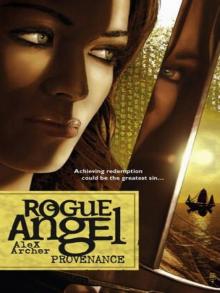- Home
- Alex Archer
Serpent's Kiss
Serpent's Kiss Read online
Table of Contents
Prologue
1
2
3
4
5
6
7
8
9
10
11
12
13
14
15
16
17
18
19
20
21
22
23
24
25
26
27
28
29
30
31
32
33
34
35
36
37
Epilogue
ROGUE ANGEL
Alex Archer
SERPENT’S KISS
Prologue
Kaveripattinam, India
509 B.C.
Sahadeva held the porcelain plate and pretended to examine it as he scanned the marketplace behind him. His heart, already beating quickly, nearly exploded when he saw their pursuers.
“They’re still there, Sahadeva.”
Jyotsna’s whisper barely reached Sahadeva’s ears. He felt her trembling at his side. The marketplace offered untold terrors for her. She’d never been in a place so big or so filled with people. Knowing that they had enemies nearby only made things worse.
Carefully, so he wouldn’t incur the ire of the merchant, Sahadeva replaced the plate on the stack. The merchant started haggling, but the attempt lacked passion. Sahadeva’s worn and dirty clothing warned all of the shopkeepers and traders that he lacked money.
After thanking the man and praising his goods, Sahadeva took Jyotsna’s hand and led her toward the alley at the shop’s side. He touched the curved knife in the sash at his waist. He’d never killed a man before. He didn’t even like slaughtering the goats to put on the family table.
But he knew he would kill the men who pursued them in order to protect Jyotsna.
She looked like a child next to him. The top of her head barely came to his shoulder. Even draped in a loose dark-blue sari anyone could see that she had a woman’s curves. Sahadeva worried her beauty might bring trouble to them in the city. A plain dupatta covered her head and held her thick black hair out of her face.
Sahadeva was young and slim. All of his life he’d been a goatherd. Nearly a year ago, when he’d turned seventeen, he’d run away from home to join a group of young men who’d decided to take a boat up the Vaigai River. Legends of gold and silver, of lost fortunes and fantastic monsters, had beckoned.
When he’d left, Sahadeva had known his father would be angry with him and his mother would be disappointed. Three days into the journey, he’d been frightened and doubtful despite the stories of adventure. Nine days later, just when they’d been about to exhaust their stores and forced to return home empty-handed, he’d seen Jyotsna and fallen in love with her.
She’d wanted to see the big world he described. Her father had denied that to her as he had denied it to all his people. Only the warriors had ventured outside the cave city to get food. Occasionally they brought brides and grooms back into their secret village.
Those brides and grooms, he’d discovered, had only been allowed to live there for a short time. Outsiders were put to death once the children were planted. Sahadeva had seen monstrous things among Jyotsna’s people. There was no sign of anyone who had come from outside their enclave to live among them.
Jyotsna had captured Sahadeva’s heart. And she had been equally drawn to him. Unable to bear the thought of his death, she had warned him of the coming assassinations. Sahadeva talked her into running away with him, and they fled.
Now all of his friends were dead. Jyotsna’s father’s warriors had killed them mercilessly. Only luck and his knowledge of the terrain along the Vaigai had prevented Sahadeva and Jyotsna from getting overtaken.
But those pursuers were here now. Even Kaveripattinam, as large as it was and open to trade around the world, wasn’t enough to hide them.
Sahadeva strode briskly through the marketplace, past the shops and hawkers, through the maze of goods and buyers, until he reached the alley. Voices, whistles, bells and animal bleats sounded all around him.
The buildings flanking the alley blocked some of the heat of the midmorning sun in the narrow expanse. By noon Sahadeva knew the stones beneath his callused feet would be blistering.
At the other end of the alley, he a saw the harbor spread out before him. Tall Roman galleys sat in the ocean. And there were more vessels from other countries.
Since he’d been a boy and his father had first allowed him to help drive goats to market, Sahadeva had loved the sea. The sailors with their stories of foreign lands and exotic sights had filled his head. When he’d talked to his father about such things, his father had told him to quit wasting his time dreaming. He’d said a goatherd would never have enough money to buy a ship, and taking passage on one as a sailor was nothing short of slavery.
Things change, Father, Sahadeva thought grimly. He approached a man arranging a cart filled with woven baskets. “Sir,” he said. “I’m looking for Harshad the jeweler.”
The man stroked his fingers in his long beard then pointed. “Harshad’s shop is in the next street. On the right.”
Sahadeva thanked him and got moving again. The crowd was thinner. He didn’t think the men who pursued them would do anything here, but there were no guarantees. They were desperate men. He’d taken more than Jyotsna when he’d left their city.
A BURLY MAN STOOD guard at the jeweler’s door. He looked half-asleep, but the sword through his sash was sharp and nicked from use. Scars showed on his thick arms.
When he started to enter, the guard put his big hand in the middle of Sahadeva’s chest and stopped him. “There’s no begging allowed in this shop.”
Despite his fear and the urgency that pressed him, Sahadeva’s pride burned. “I’m no beggar.” His hand dropped to his knife.
The guard smiled. “You’re wearing a beggar’s rags, boy. And I wouldn’t pull out that knife. Unless you’re ready to die.”
Sahadeva swallowed hard and felt his face burn with shame. “I’ve got business with Harshad.” He reached inside his shirt and took out a small oilskin pouch. Another oilskin bag was hidden inside the pack he carried, but thieves wouldn’t have wanted it. Still, he never left it unattended. “I have merchandise for sale.”
Sunlight glinted off the gold and gems inside the bag.
Jyotsna’s fingernails bit into Sahadeva’s arm. “What have you done?”
Sahadeva looked into her dark eyes. “I did what I had to so that we could be together.”
Tears glinted in her gaze and she looked away from him.
Sahadeva felt torn. He didn’t have time to explain. Jyotsna had always lived within her father’s village. She had no idea what the real world was like or what it took to live in it.
“Send the boy in here,” a man’s voice called from within the shop.
Reluctantly, the guard stepped aside.
Sahadeva moved forward. He had to pull on Jyotsna’s arm twice to get her to follow him.
Inside, the shop was small and heavily scented with incense. A thin man with graying hair and beard stood behind a counter. He wore a white tunic. Earrings, rings, necklaces, hair bands and gold-and-silver bangles hung from pegs on the wall behind him. Jewels sparkled in settings in some of them. Harshad smiled. “Welcome. What may I do for you?”
Sahadeva freed his arm from Jyotsna. He placed the oilskin pouch on the counter. “I want to trade these for gold coins.”
The jeweler spread the bag’s contents across the counte
r. Five rings, two bracelets and a loose collection of gems spread between them. Harshad looked at the jewelry with marked interest. “These are of very unusual design. Where did you get them?”
“I found them,” Sahadeva replied. “They were in the Vaigai River.”
The jeweler looked up. “Where in the Vaigai?”
Sahadeva shook his head. “There isn’t any more there.”
“Maybe you just didn’t look closely enough.”
“Then I’ll go back and look again.”
Harshad frowned. “You’ve been most fortunate, it seems.”
“How much?” Sahadeva asked.
“Are you in a hurry?”
“No,” Sahadeva lied. He’d learned at his father’s knee never to show impatience during a trade. A hasty man often got the worst of a bargain. A needy man fared even worse.
But what about a man who fears for his life? Sahadeva wondered.
“I could look at these and give you an offer tomorrow,” Harshad suggested.
“By that time I could get offers from other jewelers,” Sahadeva countered. “I was told I could get a fair price from you.”
“Wandering around the city could be dangerous,” Harshad said.
Sahadeva started gathering his treasure. “The ships are in. I want passage on one of them. Perhaps I can strike a deal with a captain who would trust his instinct for jewelry.”
“Wait,” Harshad said. He sighed. “I’m only going to do this because you look like a good boy. Although some might question if you really got these things from the river.”
Sahadeva held the bag tightly. He’d come to Harshad because he’d heard the man didn’t ask too many questions.
“Come with me.” Harshad gestured to a doorway draped by curtains. He stepped through them and waved again.
Sahadeva and Jyotsna followed him.
“Just you,” the jeweler said. “Back here I only deal one-on-one.”
Sahadeva hesitated, then turned to Jyotsna. “Stay here.”
She pulled on his arm. “Don’t leave me.”
“It’ll only be for a moment. You’ll be safe.” Sahadeva gently pulled her hands from his arm. Doing so almost broke his heart because her fear showed in her liquid gaze. “I’ll be right back. I promise.”
Jyotsna wrapped her arms around herself. As she stood there, she looked incredibly small.
Sahadeva made himself turn and follow the jeweler to the back room of the shop.
“Sit, sit.” Harshad gestured toward a chair on the other side of a small wooden table in the back room.
Sahadeva waved away the thick white smoke given off by the incense. Coils of the fragrant paste burned in every corner of the room. He sat at the table. The smoke made it hard to breathe and he immediately felt light-headed.
Harshad clapped his hands. Immediately an old woman appeared through another door and delivered a tea service. She poured cocum squash into tall glasses of water, then left without a word.
Sahadeva’s taste buds flooded at the drink’s scent. He and Jyotsna had subsisted on bread, goat’s cheese and water. Cocum squash was only available in April and May. He’d almost missed the season entirely. He picked up the glass and felt the chill.
“Let me again examine what you have,” Harshad said. He smiled once more.
Sahadeva saw the anticipation in the man’s face. Harshad clearly wanted the jewelry and gems. Slowly, Sahadeva emptied the pouch onto the table. The heavy gold smacked into the wood. The sound echoed strangely in Sahadeva’s ears.
“You found these in the Vaigai River, you say?” Harshad examined one of the rings.
“Yes,” Sahadeva said. He sipped his drink. The flavor was strong and cool.
“You’re lucky. Many men have searched that river for treasure,” Harshad said.
“I know.”
“Some soothsayers still insist there is a secret city with impossible wealth located there.”
Sahadeva’s heart thudded and his head swelled from the pressure. “I wouldn’t know about that,” he said.
“It is supposed to be a city of nagas,” Harshad said as he moved on to examine a bracelet. “Half men, half snakes. Have you ever seen such a thing?”
“No.” But Sahadeva knew well the old stories and legends told of such things.
“They lived on an island, it’s said. Then the monsoon season brought a wave that broke their island and drove them inland. They tried to live on the mainland, but they worshiped snakes and practiced bloodthirsty rituals. No one would suffer them to live there. So they fled upriver.”
Sahadeva listened without comment. He had to force himself to breathe. He wanted out of the room. Anxiety crawled over him at the thought of leaving Jyotsna with the burly guard. It was worse thinking about her father’s warriors lurking in the street.
“Do you think these things came from that city?” Harshad asked.
Sahadeva’s heartbeat became thunder in his ears. He was certain the jeweler could hear it. “No,” he lied.
“Why not?” Harshad asked.
“No one has ever proved that city ever existed,” Sahadeva said. No one had ever found the tributary Sahadeva and his friends had found, either. It went underground for a time, and if Pramath hadn’t gone hunting that morning they might never have found it, he thought.
“Still,” Harshad mused, “there is usually some kernel of truth in those old legends.”
Sahadeva said nothing. He pulled at his collar in an effort to get more air. Heat flushed his face. He forced air into his lungs.
“I’ve even been told that the things that have been found from the naga city are cursed,” Harshad said.
“Cursed?” Sahadeva’s mind tried to grasp the word but it slipped away.
“I’ve been told,” Harshad said in a quiet voice, “that the naga spirits follow anything that was taken from their city. They find them and bring them back after killing those who stole them. Do you believe in curses?”
Sahadeva thought about that for a moment while he finished the rest of his drink. He’d never actually seen a curse in effect, but he’d heard stories about them all of his life. “I don’t know,” he finally said.
“Well, it’s better to keep an open mind, perhaps. When you’ve lived as many years as I have, you’ll learn the wise men don’t have all the answers.” Harshad pushed the jewelry and gems to the center of the table. “Now we must discuss what these are worth to you.”
For the next few minutes, they haggled over the price. Sahadeva knew not to take the first offer. Only a fool and an amateur took the first offer. His father had taught him that, as well.
Finally, they agreed upon an amount. Sahadeva didn’t know if it was fair, but it was more than he’d been hoping to get for the pieces. He was certain Harshad thought he’d gotten the better of the bargain.
Sahadeva wanted only enough to arrange passage on one of the ships in the harbor. He knew he and Jyotsna would have to start over somewhere new. Perhaps Greece or Rome would be a good choice. He might even like to see Egypt. Those countries accepted foreigners.
Besides, he hadn’t shown Harshad the full treasure they’d escaped with.
“I must tell you one thing,” Harshad said at the end of the negotiations. “If these things are indeed cursed, I expect you to take them back. Is this understood?”
Sahadeva readily agreed. He didn’t believe in the curse. Even so, he would be long gone in just a matter of hours if he could find a ship putting out to sea in that time.
“I will return with your gold.” Harshad got up and left the room. He left the jewelry and gems sitting on the table.
Sahadeva felt his head grow heavier. When he turned to look at the window high on the wall, his senses whirled. He realized the colors seemed brighter than normal, and the sounds coming from outside were leaden and muffled.
Something was wrong.
He tried to stand but his legs were almost too weak to hold his weight. He gasped for air and choked on the thick inc
ense smoke. He tried to sweep the jewelry and gems into the pouch again, but only succeeded in scattering them across the table and the floor.
A cloud of smoke suddenly burst inside the room. A loud hiss accompanied it.
Startled, Sahadeva stumbled back against the wall. The acrid smoke burned his nose and throat when he inhaled it. Incredulous, he watched as a figure took shape.
The head and shoulders of a beautiful woman appeared first. Jeweled combs pinned her thick black hair atop her head. Her garments barely covered her modesty, like the garments Jyotsna’s people wore. She stood high-breasted and proud. She peered at him with the slit-irised eyes of a cat. Crimson lips parted to reveal sharp teeth. Her forked tongue slithered out to test the air.
As she moved toward Sahadeva, she rocked from side to side. Her lower half was hidden from sight by the smoke for a moment. When he saw the serpentine body that began at her waist, he tried to scream but there wasn’t enough air in the room.
From her midriff down, the woman was a snake. Glittering blue-green scales twisted as she moved. Black-and-red scales created a hard-edged pattern. In the next instant, she lunged at him and her fangs pierced his throat.
SAHADEVA WOKE to a pounding pain in his head. Blood roared in his ears. He felt dizzy, as if the world were shifting beneath him. He opened his eyes and discovered the reason for the movement.
He was in a ship’s hold. The light from a candle on a mounted sconce barely penetrated the gloom. He lay in the middle of a pool of vomit that he realized was his own. It had smeared on his clothing and made the fabric stiff. Iron manacles bound his legs to a ring set in the floor.
Where is Jyotsna? The question drove him to his feet in spite of the pain and sickness coiled in his belly. He immediately threw up again.
“Easy, now,” someone said from the darkness.
The ship tossed and turned. Timbers creaked in protest. The floor tilted so much for a moment that Sahadeva feared they were going to turn over.
Sahadeva tracked the voice and saw a man in his middle years sitting hunched against the wall. Nine others sat with him.
“Who are you?” Sahadeva asked. “What is this ship?”
“I’m a slave,” the man answered. “Like you. My name is Oorjit.”

 Rogue Angel: Forbidden City
Rogue Angel: Forbidden City The Spider Stone
The Spider Stone Provenance
Provenance Blood Cursed
Blood Cursed Fury's Goddess
Fury's Goddess The Spirit Banner
The Spirit Banner Footprints
Footprints The Pretender's Gambit
The Pretender's Gambit Rogue Angel: The Lost Scrolls
Rogue Angel: The Lost Scrolls Staff of Judea
Staff of Judea Rogue Angel 55: Beneath Still Waters
Rogue Angel 55: Beneath Still Waters The Mortality Principle
The Mortality Principle Warrior Spirit
Warrior Spirit Paradox
Paradox Tear of the Gods
Tear of the Gods Forbidden City
Forbidden City River of Nightmares (Rogue Angel)
River of Nightmares (Rogue Angel) Rogue Angel: The Secret of the Slaves
Rogue Angel: The Secret of the Slaves Destiny
Destiny Rogue Angel 51: The Pretender's Gambit
Rogue Angel 51: The Pretender's Gambit Celtic Fire
Celtic Fire Rogue Angel 54: Day of Atonement
Rogue Angel 54: Day of Atonement Day of Atonement
Day of Atonement Rogue Angel: Gabriel's Horn
Rogue Angel: Gabriel's Horn Grendel's Curse
Grendel's Curse The Matador's Crown
The Matador's Crown Rogue Angel: The Chosen
Rogue Angel: The Chosen The Other Crowd
The Other Crowd Seeker’s Curse
Seeker’s Curse Rogue Angel 52: Death Mask
Rogue Angel 52: Death Mask The Golden Elephant
The Golden Elephant Blood Cursed (Rogue Angel)
Blood Cursed (Rogue Angel) Celtic Fire (Rogue Angel)
Celtic Fire (Rogue Angel) Gabriel's Horn
Gabriel's Horn Magic Lantern (Rogue Angel)
Magic Lantern (Rogue Angel) God of Thunder
God of Thunder Clockwork Doomsday
Clockwork Doomsday The Bone Conjurer
The Bone Conjurer Treasure of Lima
Treasure of Lima The Soul Stealer
The Soul Stealer The Dragon’s Mark
The Dragon’s Mark Restless Soul
Restless Soul Rogue Angel: God Of Thunder
Rogue Angel: God Of Thunder Rogue Angel 49: The Devil's Chord
Rogue Angel 49: The Devil's Chord Death Mask
Death Mask Rogue Angel 46: Treasure of Lima
Rogue Angel 46: Treasure of Lima Swordsman's Legacy
Swordsman's Legacy The Oracle's Message
The Oracle's Message The Third Caliph
The Third Caliph Tribal Ways
Tribal Ways Phantom Prospect
Phantom Prospect Rogue Angel 50: Celtic Fire
Rogue Angel 50: Celtic Fire Library of Gold
Library of Gold Rogue Angel 53: Bathed in Blood
Rogue Angel 53: Bathed in Blood Sacred Ground
Sacred Ground The Devil's Chord
The Devil's Chord Serpent's Kiss
Serpent's Kiss The Vanishing Tribe
The Vanishing Tribe Sunken Pyramid
Sunken Pyramid Sunken Pyramid (Rogue Angel)
Sunken Pyramid (Rogue Angel) City of Swords
City of Swords Bathed in Blood
Bathed in Blood The Lost Scrolls
The Lost Scrolls The Babel Codex
The Babel Codex Mystic Warrior
Mystic Warrior Eternal Journey
Eternal Journey Beneath Still Waters
Beneath Still Waters Solomon's Jar
Solomon's Jar Beneath Still Waters (Rogue Angel Book 55)
Beneath Still Waters (Rogue Angel Book 55) Cradle of Solitude
Cradle of Solitude Secret of the Slaves
Secret of the Slaves River of Nightmares
River of Nightmares Polar Quest
Polar Quest False Horizon
False Horizon